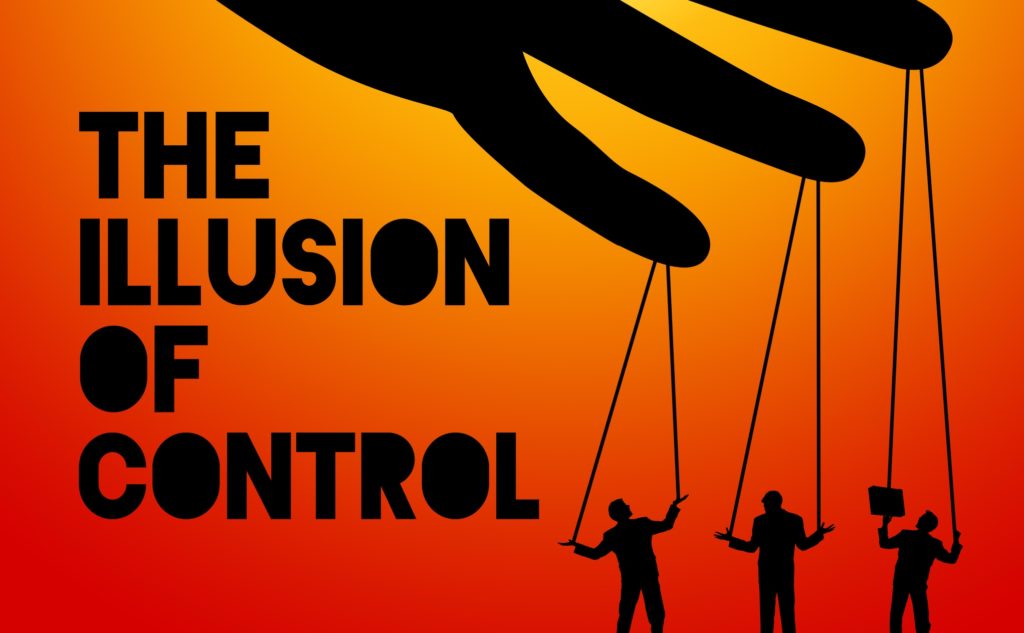
So often people say… “I just need to get this under control” or “I already have this under control.” For many of us this is the goal: Once we have gained control, we have succeeded, and maybe we even have a good life. But how can this be a goal when the only thing that is certain is that there is nothing we can control? How have we ended up having a formula for success that is so attached to something that is not possible?
Control begins and ends with fear
Fear is where it all begins… You can ask yourself: Can I handle any possible outcome of a situation, job or a relationship? And for most of us the answer is no. This fear can keep us up all night trying to figure out ways to control the outcomes of the things we meet in our career and life.
Control comes in many forms – all the way from intense micromanagement and explicit control to manipulation or making other people wrong. It can even manifest itself in subtle ways, such as the choice of which questions you ask, or how you are interested in certain topics while you avoid others.
Trying to control situations and other people does not only come from fear; it also creates fear. Most of us have at some point in our career had a leader who practiced micromanagement. And if you have had that experience you know the way this creates insecurity, anxiety and even fear. The subtler versions of control often create a sense of feeling judged, as well as a lack of openness and curiosity.
A commonality of all types of control is that they restrict the freedom to let the projects, situations, relationships and/or other people evolve naturally. With control, you limit the outcome to being guided strictly by you instead of making use of all the wisdom and resources actually available. And you use an unnecessary amount of resources yourself.
Of course, we are taking leadership of situations and people every day and we should, but leadership differs from controlling because it is based on trust and sets people free. Also, leadership let as many views and resources as possible guide a situation and qualify a decision or priority. Control can give an illusion of momentum and impact but it creates fear, insecurity and a lack of qualified input on choosing a way forward.
Control is the same as mistrust
Unneeded control is the same as mistrust. Not only is it a lack of trust in your own ability to cope with a possible situation, but also a lack of trust in what other people bring to a situation and/or relationship. Thus, trying to use excessive control is actually a declaration of mistrust, although unintentionally.
When you let go of control and welcome vulnerability and ambiguity you will not only use far fewer resources on trying to control everything, you will also be more open to the inspirations for appropriate actions along the way. Instead of using your energy on trying to foresee and preempt any possible failure and then forcing action, you will now be open to inspired action along the way guided by all involved parties.
So, when control is impossible what is the alternative?
First of all, it is important that we start inviting in the vulnerability and ambiguity that is a condition in life. You might be very skilled in controlling and manipulating but situations will arise that leave you hurt, lost and clueless. That is a part of life and it is overly strenuous to try to control your way out of it. We all need to accept that this happens for everyone. The only difference is how much we talk about it.
If you become a role model for more acceptance of this life condition you will encourage others to talk more openly about it and we will together be able to stop making full control or perfection a goal.
Secondly, we need to start experimenting with replacing control with trust. What happens if we trust instead of control? Today most of us know that micromanagement is out of fashion, but there are so many situations where most of us still prefer control over vulnerability and ambiguity.
How to start letting go of control:
- Observe yourself – where and how do you try to control things in your work and life?
- Is the control creating the result you intended?
- How much time, money and effort do you spend on keeping this control?
- Are there some of these things that are obviously a waste of time to try control?
After getting this overview of you own relationship with control you might want to start replacing control with trust.
- Identify small situations (initially with relatively low risk) where you practice control and then ask yourself: How would my way forward look if I let go and replaced control with trust?
If you start small I know you will slowly realize how control is not the best option for achieving success and wellbeing.


